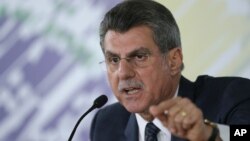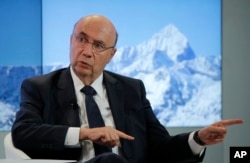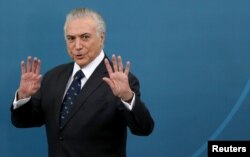Brazil's government plans to announce spending freezes of 30 billion to 35 billion reais ($9.7 billion to $11.3 billion) this week to help meet part of its 2017 budget deficit target, the Senate leader said on Tuesday.
The rest of the shortfall will have to come from raised taxes and higher revenues from such sources as infrastructure concessions to private companies, Senator Romero Jucá said in an interview.
Jucá said tax increases being studied include one on gasoline and another on financial operations called IOF, both of which would not require legislation.
“The freezes will be a maximum of 30 to 35 billion reais, More than that would be an amputation,” Jucá said.
Brazil's primary budget deficit target for this year is 139 billion reais, but a severe recession shrunk revenues and the government is expected to miss that goal by 65 billion to 70 billion reais.
Nothing has been decided
Finance Minister Henrique Meirelles told reporters that the freezes have not been decided yet, nor any tax hikes.
President Michel Temer's key measure to bring the widening deficit under control, reform of Brazil's costly social security system to make it pay for itself, is facing a battle for approval in Congress.
Jucá said the government is working on an agreement between the Senate and lower chamber on the proposal which established a minimum retirement age among other unpopular changes.
The consolidated report will cover possible adjustments to make the bill more palatable to lawmakers, and some of them will be announced by Temer by the end of this week, Jucá said.
Change in retirement age?
Jucá said he believed the government must insist on the introduction of a minimum retirement age of 65, a controversial move in a country where people on average work until they are 54.
Modernizing labor laws, next on the government's reform list to lower business costs and help pull Brazil from its worst recession, will get off the ground before the pension bill clears Congress, Jucá said.
An outsourcing bill will be put to a vote this week in the Senate and merged with another proposal from the lower chamber, so that it can be quickly sent to Temer to sign into law.
The bills face fierce opposition from labor unions who see allowing temporary workday contracts as an attack on workers' rights. Jucá said temporary union payments will be added to the legislation to keep labor leaders happy.







